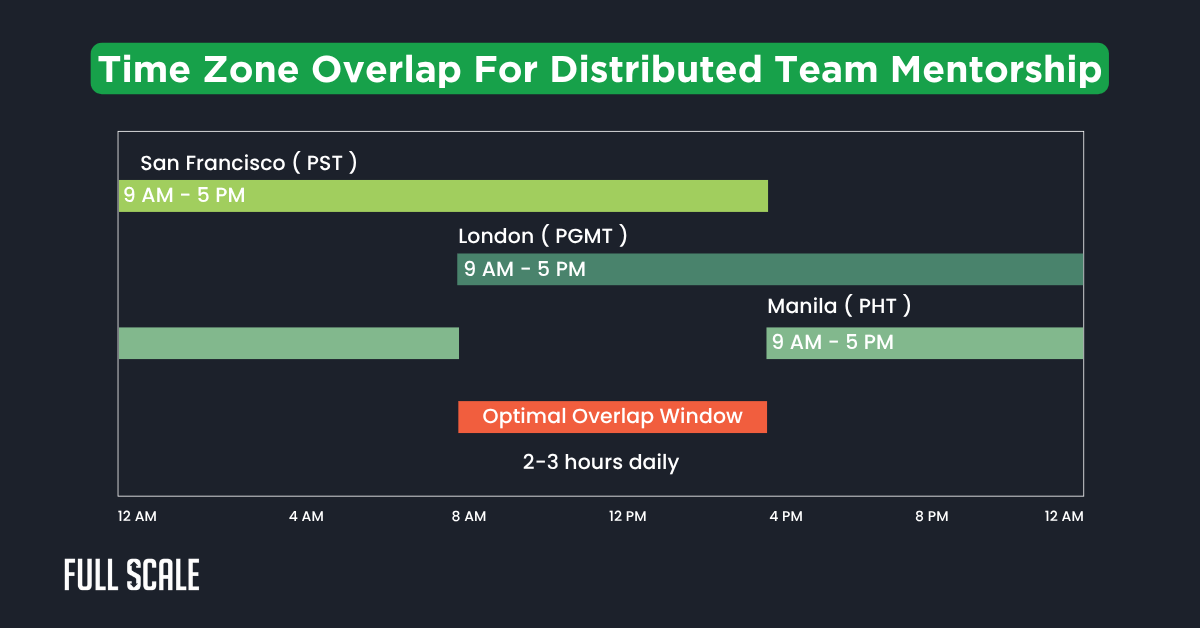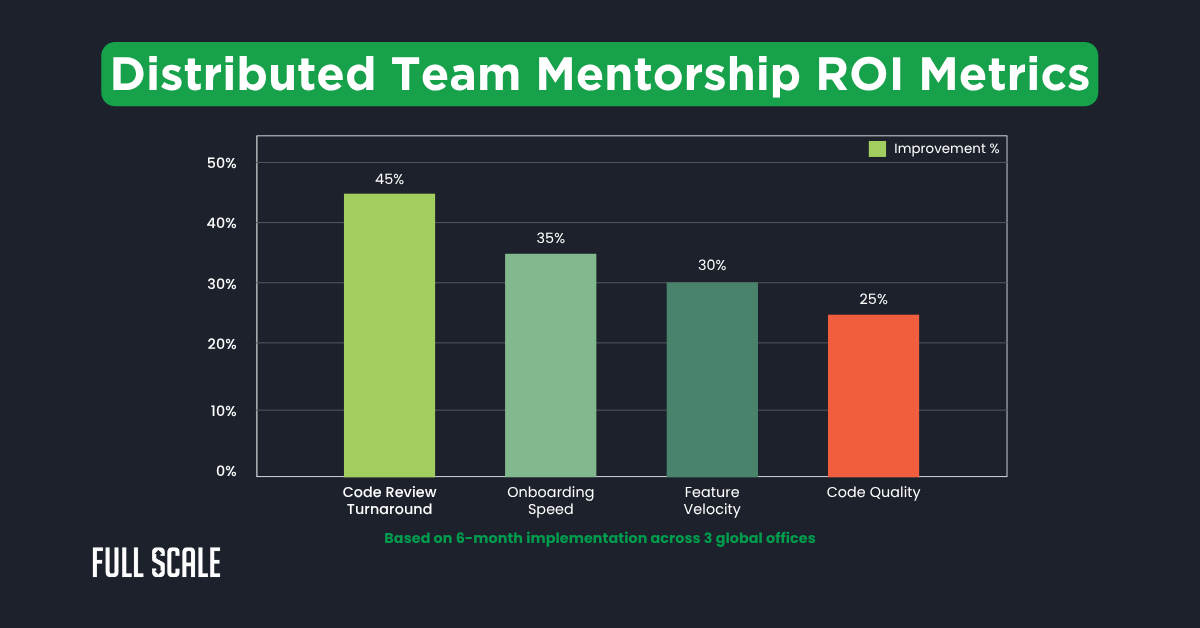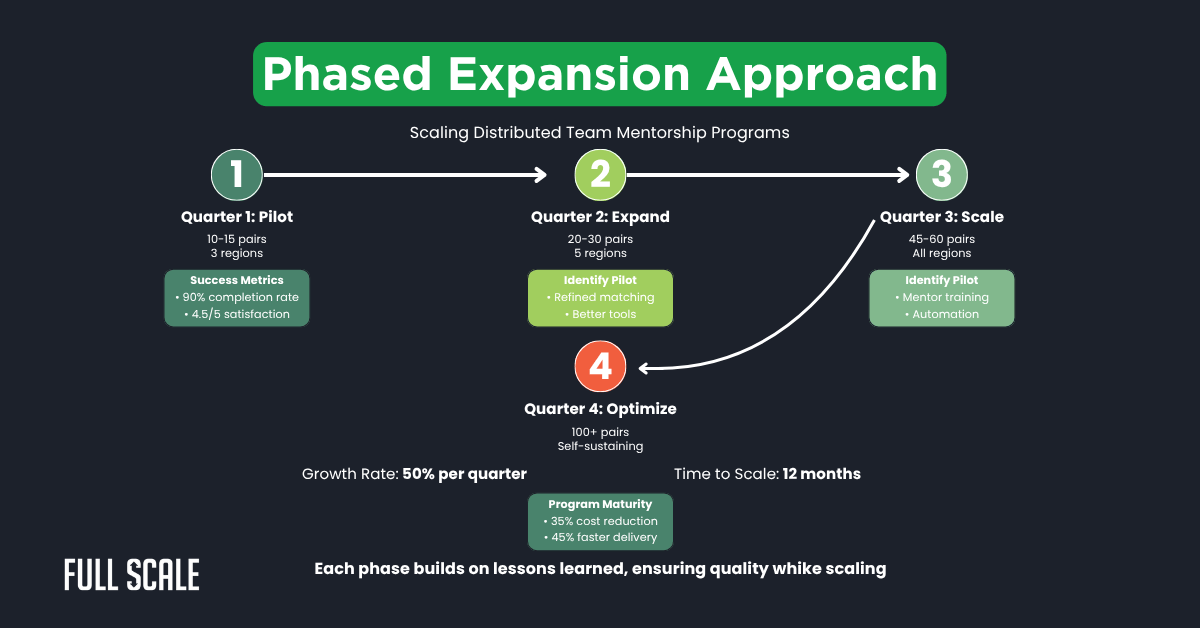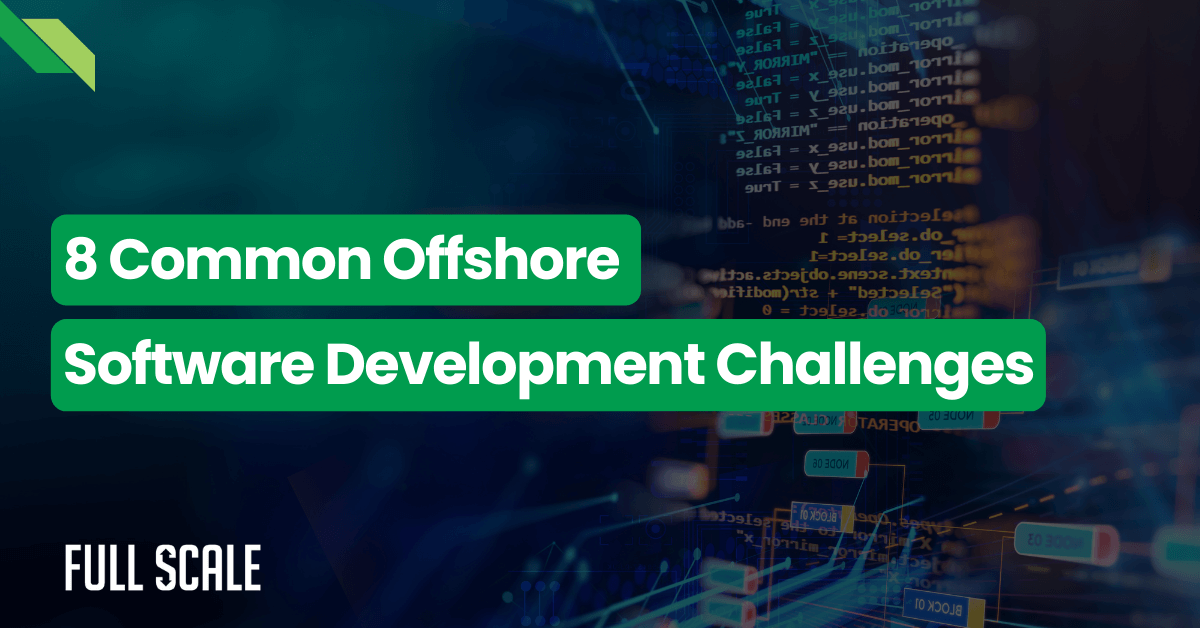Last Updated on 2025-06-16
Technical leaders face unprecedented challenges in developing talent across borders.
Distributed team mentorship has become essential for organizations seeking competitive advantages in global markets.
Recent studies show that 73% of tech companies struggle with knowledge silos between offices, while those implementing structured programs report 40% faster onboarding.
Companies with formal distributed team mentorship see 25% improvement in code quality and 30% faster delivery. Investment in cross-cultural technical coaching yields measurable returns through reduced recruitment and accelerated performance.
The Unique Challenges of Remote Developer Growth
Distributed mentorship faces obstacles that on-site programs never encounter. Understanding these challenges enables effective solutions. Time zones, cultural differences, and communication barriers require strategic approaches.
Time Zone and Communication Barriers

Cross-timezone skill development requires creative scheduling solutions. Key challenges include:
- Limited overlap: Maximum 2-3 hour daily windows between regions
- Communication delays: Asynchronous responses slow problem-solving
- Cultural context: Different educational backgrounds affect understanding
- Technical disparities: Infrastructure variations impact collaboration quality
Cultural Learning Differences
Educational backgrounds shape how developers approach virtual mentorship programs. Western self-directed learning contrasts with Eastern structured guidance preferences. Success requires adapting to these fundamental differences.
| Cultural Dimension | Western Approach | Eastern Approach | Virtual Mentorship Programs Solution |
| Learning Style | Self-directed | Structured guidance | Flexible pathways |
| Feedback | Direct/immediate | Indirect/considerate | Customized delivery |
| Questions | Encouraged frequently | Reserved | Safe spaces |
| Authority | Collaborative | Hierarchical | Clear expectations |
Building Your Distributed Team Mentorship Foundation
Successful global engineering knowledge transfer requires systematic approaches addressing unique challenges. Foundation elements determine program sustainability and impact. Strategic design enables scalable remote developer growth.
Program Structure Design

Effective offshore team development requires clear objectives and metrics:
Key Program Elements:
- Define specific skill gaps and growth targets
- Establish 1:1 and group mentorship formats
- Create documentation standards for asynchronous mentorship techniques
- Allocate 10-20% of senior developer time for coaching
Matching Strategy for Technical Talent Development
Smart matching drives distributed mentorship success through data-driven pairing. Algorithms consider multiple factors beyond technical skills alone. Cultural fit and communication styles significantly impact relationship success.
| Matching Factor | Weight | Impact on Success |
| Skill Alignment | 40% | Direct knowledge transfer |
| Timezone Overlap | 25% | Communication frequency |
| Communication Style | 20% | Relationship quality |
| Cultural Fit | 15% | Long-term engagement |
Communication Frameworks for Cross-Border Engineering Collaboration
Successful remote developer growth depends on structured communication, balancing synchronous and asynchronous elements. Limited overlap hours require maximizing every interaction. Frameworks ensure consistent value delivery across all mentorship sessions.
Optimizing Limited Synchronous Time
Virtual mentorship programs maximize precious overlap hours through structured approaches. Pre-work ensures productive discussions rather than basic explanations. Recording capabilities transform single sessions into reusable learning resources.
- Pre-session preparation: Code reviews and documentation study
- Focused agendas: Complex problems requiring real-time discussion
- Recording capabilities: Creating reusable learning materials
- Post-session tasks: Reinforcement exercises and implementation
Asynchronous Mentorship Techniques
Cross-timezone skill development thrives with proper asynchronous tools and processes. Written feedback provides reflection time for different cultural contexts. Documentation creates persistent knowledge beyond individual relationships.
Essential Components:
- Detailed code review comments explaining “why” not just “what”
- Video walkthroughs for architecture decisions
- Written feedback with cultural context consideration
- Progress tracking through automated metrics
Technology Stack for Global Engineering Knowledge Transfer
The right tools enable effective distributed mentorship across any distance. Platform selection impacts engagement and learning outcomes significantly. Integration reduces context switching and maintains momentum.
Core Platform Requirements
Technical talent development needs specialized tools beyond standard development environments. Collaboration features must support teaching, not just coding. Analytics provide objective progress measurement across regions.
- Code collaboration: GitHub/GitLab with enhanced review features
- Knowledge management: Confluence/Notion for persistent documentation
- Communication: Slack/Teams with threading and search
- Progress tracking: Custom dashboards showing skill development
Measuring Technical Talent Development Success
Comprehensive metrics validate offshore team development investments and guide improvements. Quantitative data demonstrates program ROI to stakeholders. Regular measurement enables rapid iteration and optimization.
Key metrics for offshore team development programs:
- Skill assessments: Monthly technical evaluations
- Code quality: Automated analysis showing improvement
- Contribution patterns: Increasing complexity and volume
- Career progression: Promotion rates for participants
Building Sustainable Cross-Cultural Technical Coaching
Long-term success in distributed mentorship requires organizational commitment beyond individual relationships. Cultural transformation embeds learning into the distributed team DNA. Sustainability planning ensures value delivery beyond initial enthusiasm.
Leadership and Cultural Integration
Executive participation in virtual mentorship programs sets the organizational tone. Visible leadership commitment translates to resource allocation and cultural reinforcement. Success stories inspire broader participation across all regions.
- Executives participating as mentors set the cultural tone
- Performance reviews include mentorship contributions
- Success stories shared across all regions
- Mentorship becomes a promotion prerequisite
Scaling Your Virtual Mentorship Programs
Growth strategies for distributed mentorship require phased approaches. Each expansion phase incorporates lessons from previous iterations. Quality maintenance during scaling determines long-term program success.

Phased Expansion Approach:
- Pilot with 10-15 pairs across regions
- Document lessons and adjust frameworks
- Expand by 50% each quarter
- Maintain quality through mentor training
Transform Your Distributed Teams Through Strategic Mentorship
Distributed mentorship transforms isolated developers into cohesive, high-performing units. Organizations implementing structured cross-cultural technical coaching see measurable improvements across all metrics. The evidence overwhelmingly supports investment in formal mentorship programs.
Key Success Factors:
- Clear program structure with defined objectives and success metrics
- Strategic matching considering skills, timezone, and cultural fit
- Balanced communication mixing synchronous sessions with asynchronous learning
- Appropriate technology enabling collaboration across distances
- Organizational commitment from leadership through individual contributors
Measurable Benefits:
- 45% faster code review turnaround through improved collaboration
- 35% reduction in onboarding time for new distributed team members
- 30% increase in feature delivery velocity
- 25% improvement in overall code quality metrics
- 40% higher retention rates among program participants
Action Steps for Leaders:
- Assess current knowledge distribution across global offices
- Identify skill gaps hindering cross-border engineering collaboration
- Design pilot programs for distributed mentorship
- Allocate resources for sustainable remote developer growth
- Measure impact through technical talent development metrics
Investment in global engineering knowledge transfer yields compound returns over time. The journey begins with a commitment to structured offshore team development. Start building your cross-cultural technical coaching framework today.
Accelerate Your Distributed Team Success with Full Scale
Building effective distributed mentorship requires the right talent foundation. Organizations need developers experienced in both technical excellence and cross-border engineering collaboration.
At Full Scale, we specialize in technical talent development designed for global engineering knowledge transfer. Our developers excel at cross-cultural technical coaching and remote developer growth.
Why Full Scale for Distributed Team Mentorship?
- Mentorship-Ready Talent: Developers experienced in virtual mentorship programs
- Cultural Bridge Building: Teams skilled in cross-timezone skill development
- Proven Frameworks: Established asynchronous mentorship techniques
- Scalable Growth: Support for expanding offshore team development
Transform your distributed team mentorship capabilities through strategic augmentation. Schedule your free consultation to discuss building high-performing global teams.
Build Your Mentorship-Enabled Team Today
FAQs: Distributed Team Mentorship
What are the essential components of successful distributed team mentorship programs?
Successful distributed team mentorship requires five core components:
- Structured matching system – Pair mentors and mentees based on technical skills, timezone overlap, and communication styles
- Clear program objectives – Define specific goals for technical talent development and measure progress quarterly
- Balanced communication framework – Combine weekly synchronous meetings with asynchronous mentorship techniques
- Appropriate technology stack – Use collaboration tools designed for cross-border engineering collaboration
- Executive sponsorship – Ensure leadership participation in virtual mentorship programs
How long does it take to see ROI from cross-cultural technical coaching initiatives?
Organizations typically see measurable returns from distributed team mentorship within 3-6 months:
- Month 1-2: Initial pairing and relationship building
- Month 3-4: First improvements in code quality and review turnaround
- Month 5-6: Significant gains in remote developer growth metrics
- Month 7+: Compound benefits including reduced hiring costs and faster offshore team development
Most companies report 25-45% improvement in key metrics within the first year.
What are the biggest challenges in implementing cross-timezone skill development programs?
The primary challenges in distributed team mentorship include:
- Limited synchronous time – Maximum 2-3 hour daily overlap between regions
- Cultural communication differences – Direct vs. indirect feedback preferences
- Technology barriers – Varying infrastructure quality across locations
- Engagement maintenance – Keeping momentum with asynchronous mentorship techniques
- Progress tracking – Measuring success across different time zones and cultures
How can organizations scale virtual mentorship programs without sacrificing quality?
Scaling distributed team mentorship while maintaining quality requires:
- Phased expansion – Grow by 50% per quarter with continuous evaluation
- Mentor training programs – Develop coaching skills for global engineering knowledge transfer
- Automated matching – Use algorithms to pair participants efficiently
- Documentation standards – Create reusable resources for technical talent development
- Quality metrics – Track satisfaction scores and completion rates at each phase
What budget should companies allocate for offshore team development through mentorship?
Budget allocation for distributed team mentorship typically includes:
| Component | Percentage | Monthly Cost per Pair |
| Mentor time (10-20% allocation) | 40% | $800-1,600 |
| Technology platforms | 20% | $50-100 |
| Program administration | 20% | $200-400 |
| Training and resources | 20% | $150-300 |
Total investment ranges from $1,200-2,400 per mentor-mentee pair monthly, with ROI typically exceeding 300% within one year.
How does Full Scale support companies building distributed team mentorship programs?
Full Scale accelerates distributed team mentorship success through:
- Pre-vetted developers experienced in cross-cultural technical coaching and remote developer growth
- Established frameworks for virtual mentorship programs that integrate with your processes
- Cultural expertise – Teams skilled in cross-border engineering collaboration across time zones
- Flexible engagement – Scale your technical talent development initiatives up or down as needed
- Proven results – Track record of successful global engineering knowledge transfer implementations
Our developers come ready to participate in both sides of mentorship relationships, reducing program startup time by 60%.

Matt Watson is a serial tech entrepreneur who has started four companies and had a nine-figure exit. He was the founder and CTO of VinSolutions, the #1 CRM software used in today’s automotive industry. He has over twenty years of experience working as a tech CTO and building cutting-edge SaaS solutions.
As the CEO of Full Scale, he has helped over 100 tech companies build their software services and development teams. Full Scale specializes in helping tech companies grow by augmenting their in-house teams with software development talent from the Philippines.
Matt hosts Startup Hustle, a top podcast about entrepreneurship with over 6 million downloads. He has a wealth of knowledge about startups and business from his personal experience and from interviewing hundreds of other entrepreneurs.




